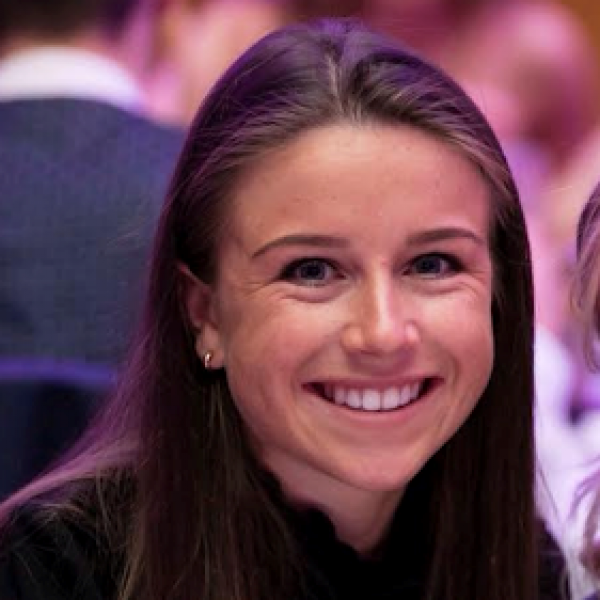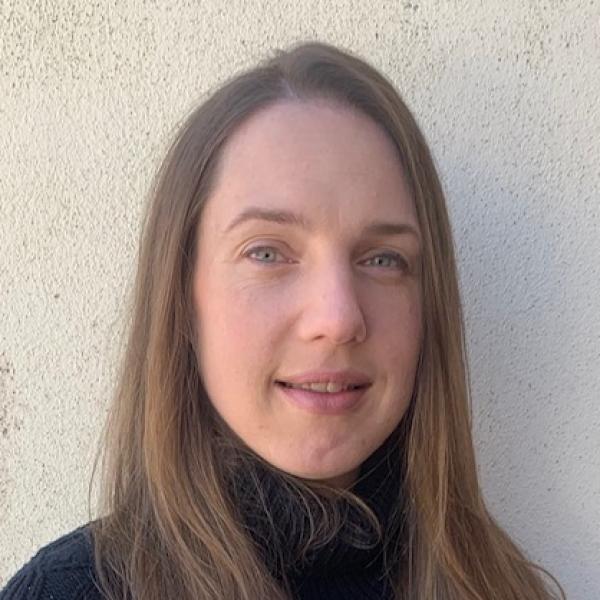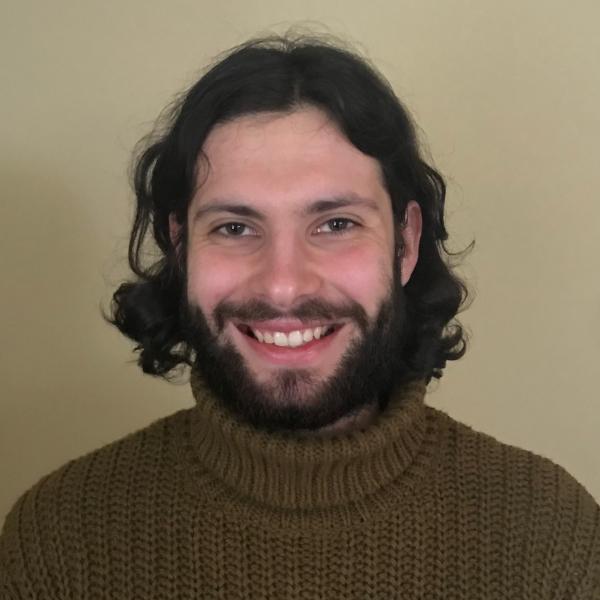Irish Cancer Society Social, Nursing and Allied Health Sciences Summer Studentships 2021
The Irish Cancer Society Social, Nursing, and Allied Health Sciences Summer Studentships 2021 programme offers undergraduate students the opportunity to undertake a cancer research project and to work with researchers in high-quality research environments. The winners of this year’s programme talk about their projects and the impact they hope their research will have.
Due to COVID-19 restrictions, these projects were delayed.

- Researcher: Amy Elliott, BSc Psychology, University College Dublin
- Project: ‘Supporting the development of a therapeutic recreation based camp programme to meet the needs of adolescents and young adults with cancer in Ireland’
It is estimated that cancer prevalence is around 550 per million per year in 15-24 year-olds (Barr et al. 2016) and this age group is currently understudied within this research area. Previously, the Irish National Cancer Strategy (2017-2026) stated that the age group of 15-24 year-olds are receiving inadequate care and require a more multi-disciplinary approach to services, therefore instigating the construction of the research with the hope of initiating a new focus on Therapeutic Recreation as a mode of support.
The objective of the research study is to provide Barretstown Children’s Charity and other services with better knowledge of how they can meet the psychosocial needs of their AYAC (Adolescents and young adults with cancer) patients. In particular, the project aims to assess the group's psychosocial needs and explore how these needs will be addressed through a Therapeutic Recreationprogramme developed and delivered by Barretstown Children's Charity Ireland. My involvement in the greater project is to support the integration and synthesis of key research findings from the project, preparing the material for sharing with the host service in order to inform the development of pilot programmes for AYACs.
- Why did you apply for the Irish Cancer Society studentship programme?
I applied for the Irish Cancer Society studentship programme as I was looking for a way to improve my research skills and gain experience in a field of research that I am particularly interested in during the summer months of my college degree in Psychology. Once I came across the summer studentship programme that the Irish Cancer Society offers I was instantly intrigued and delighted to find an opportunity to broaden my knowledge and experience in a research setting. - What made you interested in the topic of your research?
I have taken many Health Psychology modules in my degree so far and have a growing interest in this field of Psychology. The link between psychosocial wellbeing and physical wellbeing is becoming more and more relevant in the medical field and I am really excited by this area of research. Professor Guerin kindly asked me to be involved in conducting her research project with the hope of improving the psychosocial services for young adults and adolescents with cancer, which I was delighted to accept. Once I researched further into the field of psychosocial support of young adults and adolescents with cancer, the importance of this research for the lives of these patients became evident and I am grateful to be part of the aim to improve these services for this age group. - What do you personally hope to get out of the studentship?
Through completing this research project I hope to grasp a much better understanding of the application of a psychological research project into a clinical setting, as well as putting the research and data analysis skills that I have learned over the course of my degree into practice. I hope to develop key skills that are required in a research setting and develop maturity through working with and learning from researchers that are at much later stages of their Psychology career than me. - What impact you hope your research will have?
I hope that this research project will provide more knowledge and guidance of the psychosocial support needs to the current services, that contribute to the support of young adults and adolescents with cancer. This project is developing the research field of psychosocial support specifically for young adults and adolescents with cancer, but hopefully it will also provide an insight into psychosocial support that is needed by cancer patients from any age group, and will encourage research to evaluate various cancer patient age groups in the same way. Furthermore, this research may encourage more attention on psychosocial support needs for patients with chronic illnesses in general.

- Researcher: Laura Oldacres, BSc General Nursing, University College Cork
- Project: 'Interventions promoting cognitive function in patients with cancer experiencing “chemo-brain”: A systematic review to support the development of a targeted intervention.'
What is chemo-brain? Cancer survivors can experience many long-term side effects after treatment. One of these side effects is “chemo-brain”. Many chemotherapeutic agents can be toxic to the brain and have an ongoing impact on memory, concentration and thought processes. However, research into methods to reduce the experience of “chemo-brain” is limited. My research will identify the most effective interventions used to improve symptoms associated with “chemo-brain” in cancer survivors.
Individuals undergoing chemotherapy endure many side effects. A long-term side effect like “chemo-brain” can make going back to work or managing money very difficult for cancer survivors. The ongoing experience of “chemo-brain” can reduce quality of life for survivors and their families. I am hopeful that my current research project could contribute to the development of a targeted intervention for cancer survivors experiencing “chemo-brain”. I am interested in cancer survivorship and hope that my experience during this research project will contribute to my future career.
- Why did you apply for the Irish Cancer Society studentship programme?
I applied for the Irish Cancer Society studentship programme as I am interested in developing my skills in research and improving patient care. I am a third year student on the BSc general nursing programme in UCC’s School of Nursing and Midwifery. I hope the skills I learn will support my clinical nursing career and future research I hope to be involved in. - What made you interested in the topic of your research?
Following my academic studies in oncology nursing care I was saddened by the many side effects of chemotherapy. I had also been privileged to care for cancer patients during my training and saw the toll treatment was taking on them and their families. I have seen in my own family how fighting cancer affects every area of life like work, relationships, finances and mental well-being. Being able to empathise with these issues motivates me to find out more about “chemo-brain” and interventions to treat the symptoms associated with it. - What do you personally hope to get out of the studentship?
Through this studentship I hope to build on my current oncology nursing knowledge. I also hope to develop my skills in critically reviewing current research. I aim to apply these skills throughout my career, engaging with research to inform best clinical practice and patient care. - What impact do you hope your research will have?
This research project is significant to cancer survivors who are experiencing “chemo-brain” as well as individuals beginning a course of treatment who are planning for recovery. I hope this research will identify the most promising interventions for cancer survivors with “chemo-brain”. I also hope this research will highlight the experience of cancer survivors who are enduring long-term side effects from treatment. These findings could contribute to the development of an intervention to reduce the effects of “chemo-brain” and improve quality of life for cancer survivors in Ireland.

- Researcher: Omar Aftab, Applied Psychology, University College Cork
- Project: 'Reducing Susceptibility to Cancer Misinformation via a Simple Accuracy-Nudge Intervention'
This project will trial an intervention to reduce people’s susceptibility to cancer misinformation. Participants will be randomly assigned to a control or intervention condition, with those in the intervention condition being asked to rate the accuracy of headlines unrelated to cancer. I will then ask all participants to read true and false cancer stories and investigate if receiving or not receiving the intervention affects participants’ ability to determine the accuracy of these cancer stories.
- Why did you apply for the Irish Cancer Society studentship programme?
I applied for an Irish Cancer Society Studentship because I was excited by the opportunity to experience what a career in research would entail. I was especially eager to do this with the Irish Cancer Society because cancer research is such an important area. Cancer research has the potential to significantly improve people’s lives and because of this, it can be a source of tremendous good. The possibility of contributing to this invaluable body of knowledge also motivated me to apply for the studentship. - What made you interested in the topic of your research?
Misinformation has become a pervasive aspect of our world and it poses a threat to anyone who seeks accurate information about anything. However, misinformation can be subtle and is therefore more insidious than other threats. Hence, what made me interested in cancer misinformation was its apparent potential to harm people even though it may not seem overtly harmful. In relation to cancer, misinformation might lead people to neglect expert advice, engage in behaviours which increase cancer risk and choose therapies which may not be the best for them. Because of this, I feel that cancer misinformation is an important research topic. - What do you personally hope to get out of the studentship?
I hope that this studentship will help me to develop my skills as a researcher while working on a project with real-world implications. As the lead researcher, it will be my responsibility to plan, design, manage and complete the project. These project management skills will be especially valuable to me if I do pursue a career in research in the future. The possibility of honing these skills while working on a project which could have applied potential is very exciting. - What impact do you hope your research will have?
I am hopeful that I can develop an intervention which will make people less likely to fall victim to cancer misinformation. When one considers the effects which cancer misinformation can have (leading people to neglect expert advice, engage in behaviours which increase cancer risk and choose therapies which may not be the best for them), an intervention such as this would be very impactful.
For more information
Phone
1800 200 700
